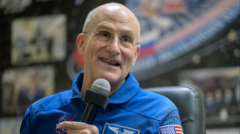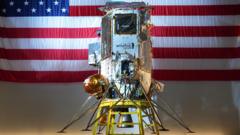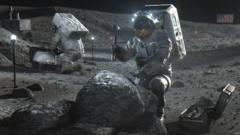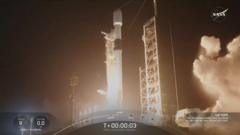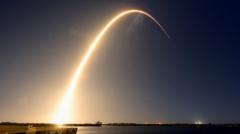Firefly Aerospace's Blue Ghost becomes the second commercial vehicle to land on the Moon, with plans for further lunar exploration that could pave the way for sustainable space missions.
Blue Ghost Achieves Milestone Moon Landing as Private Space Ventures Flourish

Blue Ghost Achieves Milestone Moon Landing as Private Space Ventures Flourish
The Blue Ghost spacecraft makes history by successfully landing on the Moon, showcasing the promising future of private space exploration.
A groundbreaking achievement has been made in the realm of space exploration, as the private spacecraft Blue Ghost successfully landed on the Moon, marking it as only the second commercial vehicle to reach the lunar surface. Launched by Firefly Aerospace on January 15, the Blue Ghost’s mission centered on exploring the Sea of Crises, a vast crater easily visible from Earth.
This landmark project underscores the growing collaboration between private companies and NASA, with another player, Intuitive Machines, expecting to land its Athena spacecraft at the Moon’s south pole soon. Intuitive Machines previously made headlines with its Odysseus spacecraft, which attempted landing on February 22 of last year but faced a disastrous tilt upon landing due to unstable terrain.
In contrast, the Blue Ghost achieved a smooth landing after a two-week orbit around the Moon, prompting cheers of jubilation at Firefly's headquarters in Texas. Dr. Simeon Barber from the Open University remarked that this marks the first successful lunar venture by a private company, emphasizing the intact and functioning state of the spacecraft.
“The implications of this mission extend beyond just lunar exploration,” Dr. Barber stated on BBC Breakfast. He explained that the Moon serves as a vital stepping stone for robotic instruments, vital in understanding how to operate under its extreme conditions of temperature, dust, and radiation.
Dr. Barber anticipates a future where humans may once again step onto the Moon, suggesting that increased private sector involvement could enhance cost efficiency through competition. He believes that advances in technology could lead to more effective landers and the extraction of lunar resources, such as water, which would be beneficial for future astronaut missions.
Another private company, Astrobotic Technology, attempted a lunar landing in January 2024 but was unsuccessful, likely due to a fuel leak that resulted in a crash landing in the Pacific Ocean. While the road ahead may present challenges, the successful landing of Blue Ghost signifies exciting new avenues for sustainable space exploration and innovation.





